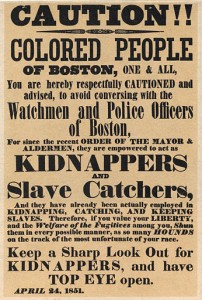… And It Acts Like Nullification
In a section devoted to “Letters to the Editor” regarding the possible secession of southern states, The New-York Times included the following summary of an 1860 revision the Massachusetts government made to its Personal Liberty Law of 1855. Personal Liberty Laws were state attempts to hamper the enforcement of the federal Fugitive Slave Act of 1850. From The New-York Times November 20, 1860:
The law recently passed by the Massachusetts Legislature provides a heavy line and imprisonment for any one who shall in any manner aid in securing a fugitive slave, and furthermore incapacitates such person from the privileges of voting or holding any office of honor or emolument within the State forever.
Is It Nullification?
The Library of Economics and Liberty has some interesting takes on the relationship between the Personal Liberty Laws and Nullification.
I’d like to hear what you think.


Sure seems like nullification to me. Certainly the intent of the personal liberty laws appears to have been to avoid compliance with the Fugitive Slave Act. As I’ve noted several times recently, most vocal advocates of secession in 1860, far from taking a states’ rights position, claimed that the Northern states were in the wrong because _they_ were attempting to assert states’ rights over federal law in this manner.
I think most abolitionists recognized that the personal liberty laws were contrary to Federal law, which is why they appealed to the “higher law” so vilified by Southerners — that a law that placed human beings into slavery could not be obeyed.
Thanks for the comment, Allen.
That seems to be one of the big questions in life. What do people do when their morality conflicts with the established law?
I can empathize with the Southerners seeing a double standard in the application of the law.
It certainly seems the Civil War was the “Irrepressible Conflict.